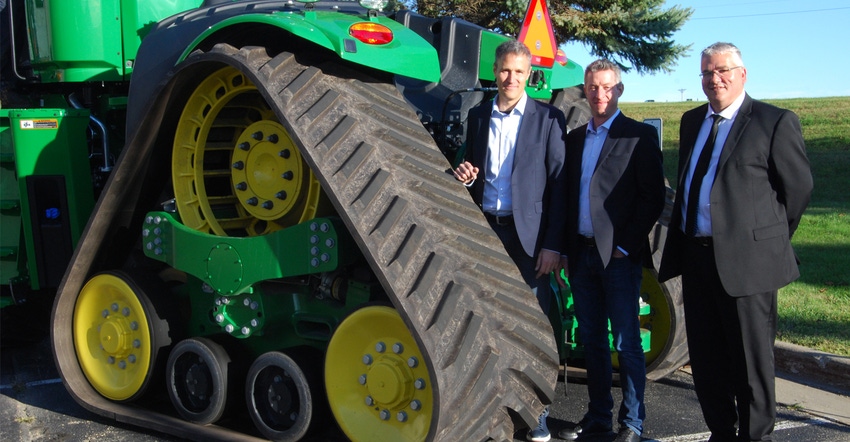December 6, 2018

The market for tracked vehicles in agriculture, construction and other off-road use continues to grow. As recently as five to 10 years ago, tracked machines had about 20% of the market, says Hugues Lajoie, vice president and general manager of the agriculture division of Camso, a manufacturer of tracks and undercarriage systems. Today, some platforms are at 40% of the market, and the trend is for more vehicles and machinery coming from the factory using tracks instead of tires.
“In agriculture, we are seeing tracks on grain carts, sprayers and planters, as well as combines and tractors,” Lajoie says. “Operating tracked equipment provides value to farmers.”
In studies conducted in cooperation with universities and farmers in Europe as well as the U.S., Camso has documented yield increases of 5% to 7% on average for crops in fields where tracked machinery is used, compared to traditional tires and duals. Part of that boost is attributable to reduced soil compaction, allowing for better root growth and water absorption in the soil. Aerial photography shows crop emergence is more uniform where track systems are used.
In addition, improved traction of tracked vehicles results in fuel savings compared to vehicles with tires. Camso has determined the cost of conversion from tires to tracks can be paid for in fuel savings and increased crop production in just a year or two.
New plant in northeast Iowa
Headquartered in Quebec, Canada, Camso does all its ag track manufacturing in the U.S. Increased demand for tracked equipment has led the company to expand its manufacturing capabilities and move its operation at Peosta in northeast Iowa into a new plant at Peosta. In October, the company held a grand opening at its new facility.
Camso has also launched a new division to remanufacture tracks. After working more than a year to perfect the process, Camso is outfitting its remanufacturing facility at Emporia, Kan., with newly designed machinery. The building being outfitted is near a factory where Camso currently makes new tracks.
The plan is to have an inventory of remanufactured tracks available from its dealer network, and to offer a rapid turnaround for customers who want to have tracks they’ve been running on remade. A customer who wants to use his or her own well-worn track carcass can call and make an appointment. The customer removes the tracks and brings them to the Kansas facility, and Camso will remake them. In 24 to 48 hours, the customer is headed home with newly remanufactured tracks that cost about 60% of the cost of a new track.
Tracks for major machinery companies
Camso supplies new tracks to all major equipment makers, including Agco, CNH, Kinze and John Deere in the U.S. and Claas in Europe. Both the Iowa and Kansas factories supply these major equipment makers with tracks and/or undercarriages.
“Over the years we’ve seen a huge increase in horsepower and size of tractors and combines,” says Lajoie. “Farm machinery operating in fields today is considerably bigger and heavier than 15 or 20 years ago, when tracks were first being introduced.”
Operating heavy equipment, farmers see the need for track systems to control soil compaction, especially in years when fields are wet such as harvest 2018. There’s also less chance of getting stuck in a wet field if you have tracks on your machine, he adds.
CTS, OEM systems available
Conversion track systems (CTS) are “bolt-on” systems to replace tires or duals on tractors and harvesting equipment. You can also order track systems on new tractors and new combines. Original equipment manufacturers have adopted track technology to their platforms and are offering track options on new equipment direct from the factory.
Either through the aftermarket network (CTS) or new from the factory, farmers now have an opportunity to get a combine, tractor or even implements on tracks, Lajoie says.
While the track and undercarriage system does cost more than buying two new dual tractor tires, the investment in tracks will pay for itself, says Jean-Francois Migneault, executive director of Camso’s agriculture systems business. He says tracks, in terms of contact with the ground, will be the equivalent of replacing the compaction caused by five to 14 wheels.
Less soil compaction, better yields
Another advantage with tracks is that with wetter soil conditions, you don’t have to wait for a field to dry completely before getting back in with a combine to continue harvesting. “A lot of farmers tell us they are getting better corn and soybean yields,” Migneault says. “In our studies of the track system, we look at how crop roots grow better and deeper in soil compared to where you use tires on a tractor or a combine or other equipment.”
To learn more about the soil compaction and yield studies showing bigger yields and less soil compaction with tracks versus tires, visit camso.co.
At the 2018 Farm Progress Show, Camso displayed it’s CTS High Speed, a conversion track system for John Deere combines. It’s a 100% bolt-on system allowing tracked harvesting machines to reach road speeds similar to wheeled combines. CTS High Speed is the first bolt-on track system for combines with an integrated final drive achieving road speeds up to 23 mph. “This increases a combine’s mobility and flotation for better access to fields with soft ground conditions,” Lajoie says. “Contact a local Camso dealer for details, or visit our website.”
Camso expands Iowa factory
Camso held an open house at its new 240,000-square-foot factory at Peosta in northeast Iowa this past October. The new location, west of Dubuque, has increased the company’s manufacturing and storage footprint in the community by 85%. The facility currently employs 120 people.
“To meet the growing demand for track systems and sustain anticipated growth in the years ahead, we had to relocate to this state-of-the-art facility from a smaller building across the street,” says Patrick Fortin, plant director at Peosta. Camso ships the track system components to machinery and equipment manufacturers worldwide from Peosta.
Why have the factory near Dubuque? “This is a key location for our customer base,” Fortin says. John Deere has tractor and machinery manufacturing facilities in Iowa and was Camso’s first contract customer, in 2007. “They gave us the chance to prove the point about the benefits of having tracks on farm machinery,” Fortin says. “Today we have more companies than John Deere as a customer, but Deere remains a big customer. We have a product development team in Quebec. They come to the U.S. to meet customers, dealers and farmers. There is a benefit to having a product development site and manufacturing facilities close to the people who are using our products.”
About the Author(s)
You May Also Like






